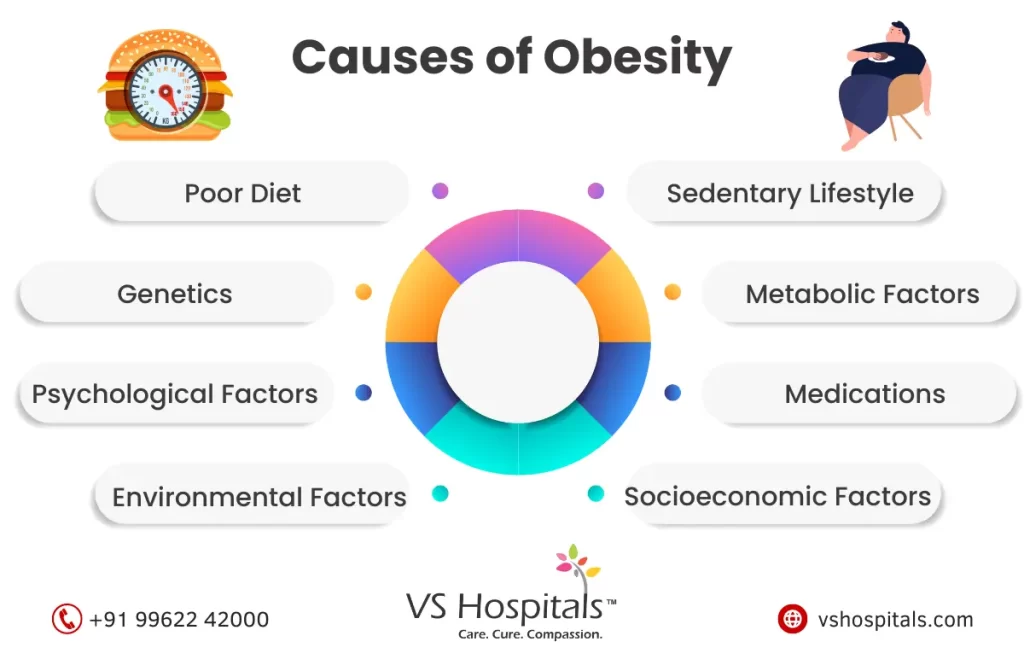In today’s modern world, obesity has emerged as a global health concern affecting millions of individuals across various age groups. The complex nature of obesity makes it crucial to understand its causes, recognize its symptoms, and explore effective treatment options. This blog aims to shed light on the top 10 obesity causes symptoms and treatment to emphasize prevention strategies.
Obesity Causes Symptoms and Treatment
Poor Diet and Nutrition
One of the primary causes of how obesity causes diabetes is a poor diet characterized by excessive consumption of high-calorie, nutrient-poor foods. Consuming processed foods, sugary beverages, and foods rich in saturated fats contributes to weight gain and obesity. These unhealthy dietary choices often lack essential nutrients, causing individuals to consume excessive calories without meeting their nutritional needs.

Sedentary Lifestyle
The sedentary nature of modern living, with increased screen time and decreased physical activity, plays a significant role in the rising obesity rates. Prolonged periods of sitting, whether at work or during leisure time, lead to reduced energy expenditure and a higher likelihood of weight gain. Insufficient physical activity hampers obesity causes symptoms and treatment to burn calories and maintain a healthy weight.
Genetic Factors
Genetic predisposition can contribute to obesity, as certain individuals may inherit genes that affect their metabolism, fat storage, and appetite regulation. While genetics alone may not determine obesity, they can influence an individual’s susceptibility to weight gain. Understanding the genetic factors associated with obesity can assist in personalized treatment approaches.
Environmental Factors
The environment we live in significantly impacts our eating and physical activity habits. Access to healthy food options, neighbourhood safety, community resources, and urban design all influence obesity rates. Environments that lack affordable nutritious food, safe recreational spaces, and opportunities for physical activity can promote obesity causes symptoms and treatment.
Emotional and Psychological Factors
Emotional and psychological factors play a role in obesity, as individuals may turn to food as a means of comfort or coping with stress, depression, or other emotional challenges. Binge eating disorder, emotional eating, or any other mental health conditions can also contribute to how obesity causes diabetes besides the difficulties in maintaining a healthy lifestyle.
Medications
Certain medications, such as antidepressants, antipsychotics, corticosteroids, and some contraceptives, have been associated with weight gain as a side effect. It is crucial for individuals to know how obesity causes diabetes. This further leads them to take medications to be aware of this potential effect and work closely with healthcare professionals to manage their weight effectively.
Sleep Deprivation
Inadequate sleep or sleep disorders, such as sleep apnea, can disrupt hormonal balance, leading to increased appetite and food cravings. Sleep deprivation affects the production of hormones like leptin and ghrelin, which regulate hunger and satiety. Poor sleep patterns can contribute to weight gain and obesity causes symptoms and treatment over time.
Socioeconomic Factors
Socioeconomic factors, including income level, education, and social determinants of health, play a significant role in obesity rates. Limited access to resources, education about healthy eating, and opportunities for physical activity can disproportionately affect individuals from lower socioeconomic backgrounds, contributing to obesity disparities.
Childhood Habits and Parental Influence
Early childhood experiences and habits can have a lasting impact on weight management. Children who grow up in households with unhealthy eating patterns and sedentary lifestyles are more likely to develop obesity. Parents and caregivers play a crucial role in establishing healthy habits and providing nutritious meals and active environments for their children.
Medical Conditions
Certain medical conditions, such as hypothyroidism, polycystic ovary syndrome (PCOS), and hormonal imbalances, can contribute to weight gain and obesity. It is important to identify and address these underlying medical conditions to effectively manage weight and overcome obesity causes symptoms and treatment.
Symptoms and Treatment
The symptoms of obesity can vary but commonly include excessive weight gain, a high body mass index (BMI), increased body fat, and a higher risk of developing other health conditions.
Treating obesity requires a multifaceted approach that includes lifestyle modifications such as adopting a balanced diet, increasing physical activity, and incorporating behavioral changes. In some cases, medication or bariatric surgery may be recommended for individuals with severe obesity causes symptoms and treatment. It is important to consult healthcare professionals to determine the most appropriate treatment plan tailored to individual needs.
Prevention Strategies
Preventing obesity is essential for maintaining optimal health. Some effective prevention strategies include promoting healthy eating habits, regular physical activity, and fostering a supportive environment at home, school, and the community. Educating individuals about nutrition, raising awareness about the importance of physical activity, and implementing policies that prioritize access to healthy foods and safe spaces for exercise is key to combating obesity.
Conclusion
To conclude, by prioritizing prevention strategies and adopting a holistic approach, individuals and communities can work towards a healthier future, free from the burden of obesity causes symptoms and treatment.
Read also Top 10 Multispeciality Hospitals in Chennai.





